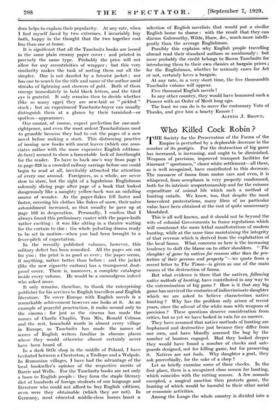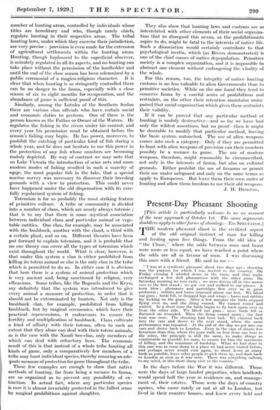Who Killed Cock Robin ?
THE Society for the Preservation of the Fauna of the Empire is perturbed by a deplorable decrease in the number of its proteges: For the destruction of big game has increased, is increasing, and ought to be diminished. Weapons of precision, improved transport facilities for itinerant "sportsmen," closer white settlement—all these, as is well recognized, have contributed to this decrease. The massacre of fauna from motor cars and even, it is whispered, from aeroplanes is very properly condemned, both for its intrinsic unsportsmanship and for the ruinous expenditure of animal life which such a method of hunting entails. We know, too, that despite the 'most benevolent protestations, many films of no particular value have been obtained at the cost of quite unnecessary bloodshed.
This is all well known, and it should not be beyond the wits of colonial Governments to frame regulations which will counteract the more lethal manifestations of modern hunting, while at the same time maintaining the integrity of that revenue which is derived from the exploitation of the local fauna. What concerns us here is the increasing tendency to shift the blame on to other shoulders. " The slaughter of game by natives for reasons other than the pro- tection of their persons and property "—we quote from a recent letter to The Times—is given as one of the main causes of the destruction of fauna.
But what evidence is there that the natives, following native methods of hunting, have contributed in any way to the extermination of big game ? How is it that any big game has survived the centuries of indiscriminate slaughter which we are asked to believe characterizes native hunting ? Why has the problem only arisen of recent years, since the advent of the white man with weapons of precision ? These questions deserve consideration from critics, but as yet we have looked in vain for an answer.
They have assumed that native methods of hunting are haphazard and destructive just because they differ from our own, and have blandly assessed the bag by the number of hunters engaged. Had they looked deeper they would have found a number of checks and safe- guards designed, not for killing game, but for preserving it. Natives are not fools. Why slaughter a goat, they ask proverbially, for the sake of a chop 2.
Let us briefly examine some of these checks. In the first place, there is a recognized close season for hunting, which coincides with the rutting season. A few nomads excepted, a magical sanction then protects game, the hunting of which would be harmful to their other social or economic activities.
Among the Lango the whole country is divided into a ,number of hunting areas, controlled by individuals whose titles are hereditary and -who, though rarely chiefs, . regulate hunting in their respective areas. The tribal hunting laws, under which they exercise their jurisdiction, are- very_precise : provision is.even made for the extension of agricultural settlements within the hunting areas. Hunting, though haphazard to the superficial observer, is minutely regulated in all its aspects, and. no hunting can take place without the permission of the landholder and until the end of the close season has been solemnized by a public ceremonial of a magico-religious character. It is clear that when hunting is so stringently controlled there can be no danger to the fauna, especially with a close season of six to eight months for recuperation, and the abundance of game is sufficient proof of this.
Similarly, among the Lotuko of the Southern Sudan there are various clan officials who have certain social and economic duties to perform. One of these is the person known as the Father or Owner of the Waters. He regulates the fishing in the rivers under his control, and every year his permission must be obtained before the season's fishing may begin. He has power, moreover, to prohibit the catching of particular kind of fish during a whole year, and he does not hesitate to use this power in the protection of any fish whose numbers are becoming 'unduly depleted. By way of contrast we may note that on Lake Victoria the introduction of seine nets and more modern modes of fishing resulted in such a scarcity of ngege, the most popular fish in the lake, that a special marine survey was necessary to discover their breeding grounds with a view to protection. This could never have happened under the old dispensation with its care- fully regularized system of fishing.
Totemism is for us probably the most striking feature of primitive culture. A tribe or community is divided into a number of clans, which are nearly always totemic ; that is to say that there is some mystical association between individual clans and particular animal or vege- table entities. One clan, for example, may be associated with the bushbuck, another with the eland, a third with a certain plant, and so on. Different theories have been put forward to explain totemism, and it is probable that no one theory can cover all the types of totemism which exist throughout the world. What is clear, however, is that under this system a clan is either prohibited from killing its totem animal or else is the only clan in the tribe which is permitted to do so. In either case it is obvious that here there is a system of animal protection which is very ancient and, being sanctioned by religion, very efficacious. Some tribes, like the Baganda and the Keyu, say definitely that the system was introduced to give every animal a measure of protection, in order that it should not be exterminated by hunters. Not only is the bushbuck clan, for example, prohibited from killing bushbuck, but by magical ceremonies, which have their practical repercussions, it endeavours to ensure the fertility and multiplication of bushbuck. Clans cultivate a kind of affinity with their totems, often to such an extent that they alone can deal with their totem animals, as is the case with the Nandi bee-clan, only members of which can deal with refractory bees. The economic result of this is that instead of a whole tribe hunting all kinds of game, only a comparatively few members of a tribe may hunt individual species, thereby ensuring an ade- quate measure of protection for game throughout the tribe.
These few examples are enough to show that native methods of hunting, far from being a menace to fauna, are so organized as to prevent any possibility of ex- tinction. In actual fact, where any particular species is rare it is almost invariably protected in the fullest sense by magical prohibitions against slaughter. They also show that hunting laws and customs are so interrelated with other elements of their social organiza- tion that to disregard this nexus, as the prohibitionists aspire to do, might be fatal to the interests of native life. Such a dissociation would certainly contribute to that psychological inertia, which (as Rivers demonstrated) is one of the chief causes of native depopulation. Primitive society is a complex organization, and it is impossible to abstract one element without endangering the vitality of the whole.
For this reason, too, the integrity of native hunting customs is no less valuable to alien Governments than to primitive societies. While on the one hand they tend to conserve fauna by a careful series of prohibitions and restraints, on the other their retention maintains unim- paired that social organization which gives these restraints their validity.
If it can be proved that any particular method of hunting is unduly destructive—and so far we have had only the wildest assertions, but no proof—then it might be desirable to modify that particular method, leaving the basic system untouched. The use of alien weapons comes into such a category. Only if they are permitted to hunt with alien weapons of precision can their numbers possibly be a menace to game. The use of modern weapons, therefore, might reasonably be circumscribed, not only in the interests of fauna, but also on cultural grounds. Either prohibit the use of firearms or permit their use under safeguard and only on the same terms as apply to Europeans. But leave them their own codes of hunting and allow them freedom to use their old weapons.
J. H. DRIBERG.

































 Previous page
Previous page